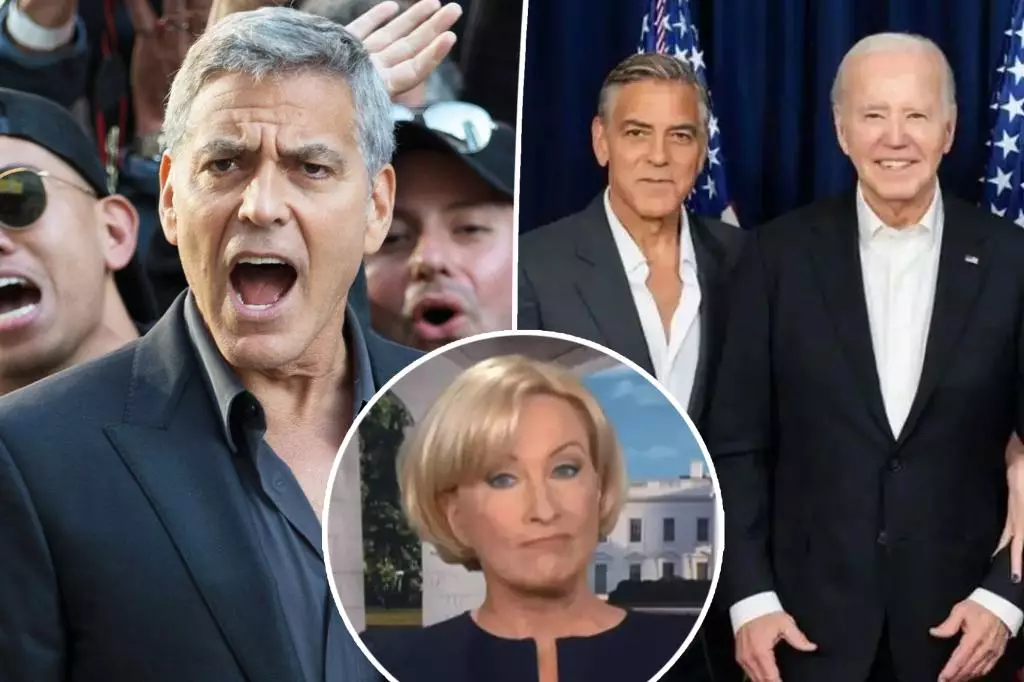The world of celebrity culture is often rife with scandals, but when a figure like George Clooney finds himself embroiled in a public outburst, it brings to light the tension that exists between Hollywood and political discourse. The details of this recent episode, highlighted in Chris Whipple’s book “Uncharted,” show us how a simple implication can lead to fiery confrontations in the realms of fame and politics. The incident revolves around Clooney’s rage directed at Mika Brzezinski of MSNBC’s “Morning Joe” after she suggested that former President Barack Obama might have influenced his op-ed regarding Joe Biden’s candidacy for the 2024 elections.
Clooney, known not only for his acting career but also for his robust political engagements, allegedly lost his temper during a phone call with a producer from the show. This event tells us more than just the story of a celebrity’s anger; it exposes the fragile dynamics in how celebrities engage with both the media and political narratives.
The Fragile Alliance Between Celebrities and Media
As public figures, celebrities often walk a fine line between their personal beliefs and the public perception of their actions. Clooney’s anger comes from a deep-seated concern for his integrity—a sense that his opinions might be perceived as mere puppetry under the influence of a former president. This scenario reflects a broader and significant issue: the dangers of assumption in journalism. Brzezinski’s remarks potentially painted Clooney as a mouthpiece instead of recognizing his independent voice, and this can infuriate anyone who values their autonomy.
In a world where social media amplifies every comment made, the potential for misinterpretation multiplies, leading to situations where even friendships can be strained. The exchange described was marked by aggressive language, indicating that Clooney felt personally betrayed by a friend who failed to defend him publicly. The very idea that a producer would casually downplay the interactions lends itself to the notion that celebrity relationships are often transactional and precarious.
Behind the Hollywood Curtain
The confrontation between Clooney and the producer shows the stark reality of how emotions run high within the entertainment industry. The verbal exchanges—filled with profanity—illustrate not just irritation, but an atmosphere of frustration that permeates these relationships. Clooney’s response, claiming that his trust was shaken, speaks volumes to the intricacies of loyalty in a sector often driven more by publicity than genuine camaraderie.
However, such outbursts also pose the question of accountability; when does celebrity outrage cross over from justified anger to an overreaction? While Clooney has a legitimate concern about being misrepresented, the intensity of his response raises eyebrows. It reveals a side of the celebrity that is all-too-human: raw emotion responding to what feels like a personal attack in an increasingly hostile media landscape.
The Journalist’s Perspective
Tara Palmeri’s commentary alongside Whipple’s revelations emphasizes an intriguing dynamic; a lesser-known producer standing up to a high-profile actor represents a shift in balance within media narratives. By not backing down, the producer shows bravery that is often missing in the celebrity-journalist relationship. It begs the question of how journalists can navigate these waters delicately, respecting the integrity of public figures while also fulfilling their duty to inform the public—even when it results in strained relations.
Moreover, Palmeri’s insights indicate that her perspective isn’t entirely supportive of Clooney’s position. It suggests a growing trend where journalists feel empowered to challenge, critique, and sometimes rebuff the likes of high-profile celebrities. The fallout from such confrontations could reframe future dialogues between media figures and their famous counterparts.
As we navigate this incident, we discover that it serves as a snapshot of a broader cultural conflict. The intersection of celebrity scandal, media representation, and political context is fertile ground for tension. Clooney’s episode is not just about an angry phone call; it represents the complexities involved when personal beliefs collide with public perceptions, further illustrating why celebrities should tread carefully in the intersection of fame and politics. Engaging in dialogue about these topics necessitates careful consideration of the implications, both for the individual actor and the greater public discourse.

